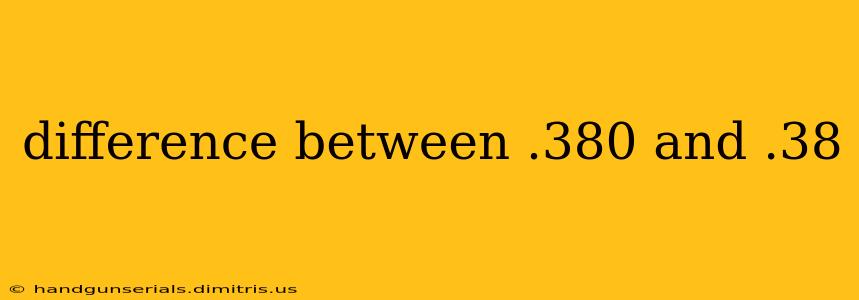The seemingly minor difference in nomenclature between the .380 ACP and the .38 Special often leads to confusion. While both are pistol cartridges, their design, performance, and applications differ significantly. Understanding these differences is crucial for anyone interested in firearms, self-defense, or simply expanding their knowledge of ballistics.
Cartridge Dimensions: A Key Distinguishing Feature
The most fundamental difference lies in the cartridge dimensions themselves. The .380 ACP (Automatic Colt Pistol), also known as 9mm Kurz (short), is a smaller, shorter round compared to the .38 Special. This size difference directly impacts several aspects of their performance.
.380 ACP (9mm Kurz)
- Smaller Case: This results in less powder capacity, leading to lower velocity and energy.
- Shorter Barrel Length: Generally used in smaller, more compact handguns, often favored for concealed carry.
- Lower Recoil: The reduced power translates to less felt recoil, making it easier to handle for smaller individuals or those new to firearms.
.38 Special
- Larger Case: Allows for a greater powder charge, resulting in higher velocity and energy.
- Longer Barrel Length: Commonly found in revolvers and larger semi-automatic pistols.
- Higher Recoil: The increased power generates more recoil, demanding more control and experience from the shooter.
Ballistic Performance: Power and Range
The differences in cartridge dimensions directly influence their ballistic performance. The .38 Special significantly outperforms the .380 ACP in terms of velocity, energy, and effective range.
Velocity and Energy:
The .38 Special boasts a considerably higher muzzle velocity and kinetic energy. This translates to greater stopping power and penetration, making it a more effective round for self-defense at longer ranges. The .380 ACP offers less stopping power and a shorter effective range.
Range and Accuracy:
Due to its higher velocity and energy, the .38 Special offers a longer effective range and generally better accuracy at longer distances. The .380 ACP is more suitable for close-quarters self-defense scenarios.
Applications and Use Cases:
The choice between these cartridges heavily depends on intended use.
.380 ACP:
- Concealed Carry: Its smaller size and lower recoil make it ideal for concealed carry, particularly for individuals seeking a more manageable firearm.
- Self-Defense (Close Range): Effective in close-quarters self-defense scenarios.
- Smaller Handguns: Commonly chambered in smaller, lighter handguns suitable for everyday carry.
.38 Special:
- Self-Defense (Longer Range): Offers greater stopping power and range, making it more suitable for self-defense scenarios where a longer range engagement might be necessary.
- Target Shooting: Frequently used in recreational target shooting due to its readily available ammunition and manageable recoil (though higher than .380 ACP).
- Law Enforcement (Historically): Though less common now, it has a long history of use in law enforcement.
Conclusion: Choosing the Right Cartridge
Ultimately, the choice between a .380 ACP and a .38 Special depends on individual needs and preferences. The .380 ACP prioritizes concealability and ease of handling, while the .38 Special offers superior power and range. Careful consideration of these factors is essential for selecting the most appropriate cartridge for your specific purpose. Always consult with experienced firearms professionals and undergo proper training before handling any firearm.

